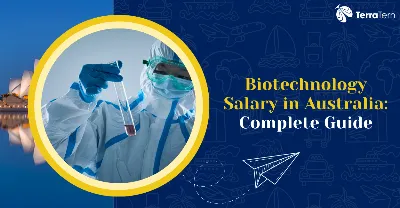Key Highlights
- What Is the Average Biotechnology Salary in Australia in 2025?
- How Much is the Latest BSc Biotechnology Salary in Australia for Graduates?
- What is the Latest MSc Biotechnology Salary in Australia that graduates Can Expect?
- How Does the Experience Level Impact Biotechnology Salaries in Australia?
- Which Cities in Australia Offer the Highest Biotechnology Salaries in 2025?
- What Are the Latest Top-Paying Biotechnology Job Roles in Australia?
- What are the Latest Factors Influencing Biotechnology Salaries in Australia in 2025?
- What Is the Current Gender Pay Gap in Australian Biotechnology?
- What Benefits and Bonuses Do Biotechnology Professionals Receive in Australia in 2025?
- How Do Public and Private Sector Biotechnology Salaries Compare in 2025?
- What Is the Job Outlook for Biotechnology Professionals in Australia in 2025?
- How Can Current International Students Access Biotechnology Jobs in Australia 2025?
- What Current Resources Are Available for Biotechnology Salary Research in Australia?
- Conclusion
The biotechnology salary in Australia is becoming more competitive, with the industry registering booming growth in the pharmaceuticals, research, and healthcare sectors, as well as in agriculture and environmental sciences. By 2025, biotechnology professionals will earn between AUD 64,900 and AUD 190,400/year, depending on experience, education, specialisation, and type of employer.
The salary of entry-level graduates with a BSc in Biotechnology ranges between AUD 60,000 and 72,400, whereas MSc graduates receive a higher wage of AUD 93,800-123,800.
What Is the Average Biotechnology Salary in Australia in 2025?

Biotechnology salary in Australia received an average annual wage of AUD 125,400 in 2025. The average income is AUD 123,000, with the lowest and highest rates of AUD 64,900 to AUD 190,400, respectively, based on experience and position.
Salary percentiles:
-
25th Percentile: AUD 78,000
-
50th Percentile: AUD 123,000
-
75th Percentile: AUD 160,000
Salaries in comparison with the national average wages: Biotechnology salaries are high based on the skill intensity of the industry and the increase in specialised jobs (in contrast with the average Australian wage, namely, the AUD 90,000).
How Much is the Latest BSc Biotechnology Salary in Australia for Graduates?
The following are the opening BSc Biotechnology salary in Australia graduates:
Average starting salary is AUD 60,000–70,000
Basic job positions are Biological Technician, Research Assistant, and Quality Assurance Coordinator.
Salary increment within the initial five years:
-
0-2 Years: AUD 60,000–72,400
-
2-5 Years: AUD 72,400–90,000
Determinants of BSc Biotechnology salary in Australia down the line:
-
Bioinformatics and laboratory techniques.
-
Internship experience, or research experience.
-
Geographic location
-
Reputation of the employer and industry.
Also Read: Working Holiday Visa Australia 462
What Current Entry-Level Positions Are Available for BSc Biotechnology Graduates?
The entry-level positions available are:
-
Biological Technician: AUD 44,000-130,000, assisting in laboratory experimentation and documenting research.
-
Research Laboratory Technician: The median income ranges from AUD 62,000 and works at a university or a research institute.
-
Quality Assurance Coordinator: Oversees adherence to the regulatory requirements. The salary begins at approximately AUD 65,000.
-
Biotech Manufacturing Roles: The lowest positions are entry-level production and process assistant, AUD 60,00085,000.
-
Positions in Agricultural Biotechnology: Agricultural Biotechnology is a developing field that improves crops and biotech usage in agriculture, AUD 55,000 -80,000.
How Can BSc Graduates Increase Their Starting Salary in 2025?
How can biotechnology salary in Australia increase their starting salary?
-
Acquire Industry Qualifications: GCP, GLP, or quality assurance qualifications.
-
Complete Internships: Or placements to acquire hands-on experience.
-
Master Technical Skills: Bioinformatics, data analysis, and lab methods.
-
Target High-Paying Cities: Sydney, Perth.
Become a member of professional associations, such as AusBiotech and Biotech Society.
What is the Latest MSc Biotechnology Salary in Australia that graduates Can Expect?
Graduates of the MSc biotechnology have high entry salaries attributable to skill and specialisation.
-
Mean MSc Biotechnology Salary in Australia: AUD 93,800-123,800.
-
On Top of the BSc Salary Increment: Around 49%
The jobs available in the middle of your career are senior biotechnologist, bioprocess engineer, and research scientist.
Return on investment (ROI):
-
MSc program cost is AUD 37,800–114,000
-
The MSc Biotechnology salary in Australia allows graduates to recoup their investment in 36 years with an average salary increment of about 49.
Which Current MSc Specialisations Offer the Highest Salaries?
Which biotechnology salary in Australia is the highest?
-
Bioinformatics Specialist: AUD 75,000130,000.
-
Bioprocess Engineer: AUD 80,000–140,000
-
Regulatory Affairs Specialist: AUD 70,000115,000.
-
Clinical Research Associate: AUD 60,000100,000.
-
Quality Assurance Manager: AUD 95,000.
What Is the ROI of Pursuing an MSc in Biotechnology in Australia in 2025?
What is the cost of a biotechnology salary in Australia?
-
Typical Cost of MSc degree Programs: AUD 37,800-114,000.
-
Salary Difference: AUD 93,800-123,800 vs BSc 60,000-72,400
-
Breakeven Period: 3- 6 years.
-
Long-Term Advantages: Availability of older jobs, leadership positions, and more remunerative specialisations.
How Does the Experience Level Impact Biotechnology Salaries in Australia?
Promotion based on experience:
-
0-2 Years: AUD 72,400
-
2-5 Years: AUD 93,800 (+31%)
-
5-10 Years: AUD 128,400 (+40%)
-
10-15 Years: AUD 157,600 (+20%)
-
15-20 Years: AUD 168,700 (+9%)
-
20+ Years: AUD 184,700 (+8%)
Also Read: Skilled Independent Visa Australia 189
What Current Career Progression Path Do Biotechnologists Follow in Australia?
What career progression does the biotechnology salary in Australia follow?
-
Junior Biotechnologist (0-2 Years): Basic competency training, laboratory, and work.
-
Biotechnologist (2-5 years): Cross-Functional Project Leadership.
-
Senior Biotechnologist (5-8 Years): Strategic programs, mentoring.
-
Lead/Principal Biotechnologist (8+ Years): Department management, high-level industry presence.
How Quickly Can Biotechnologists Advance Their Careers in Australia in 2025?
How fast can biotechnology salary in Australia advance?
-
Normal Level of Promotion: 2-5 years.
-
Skills That Can Lead to Quicker Progression: Project management, advanced laboratory methods, and certifications.
-
Firm Size and Organisation: Bigger companies might promote more slowly and steadily, whereas startups might be more rapid.
Which Cities in Australia Offer the Highest Biotechnology Salaries in 2025?

Which biotechnology salary in Australia offers the highest salaries?
-
Brisbane: AUD 137,100
-
Sydney: AUD 130,400
-
Perth: AUD 130,500
-
Melbourne: AUD 128,200
-
Adelaide: AUD 127,700
-
Canberra-Queanbeyan: AUD 116,400
The increase in salaries in Sydney and Brisbane can be compensated for by the rise in the cost of housing, whereas the cost of housing is more affordable in smaller cities.
How Does the Cost of Living Affect Current Real Biotechnology Income Across Australian Cities?
Does biotechnology salary in Australia affect cost of living?
-
Sydney & Melbourne: Increased wages, increased rent.
-
Brisbane & Adelaide: Fair wages and cheaper living standards.
-
Canberra: Mid-level wages mean a more expensive life.
Which Australian Cities Have the Most Biotechnology Job Opportunities in 2025?
Which biotechnology salary in Australia has the most opportunities?
-
Melbourne: CSL corporate office, biotech startups, research centres.
-
Sydney: Pharmaceutical and research centre.
-
Brisbane: Developing a startup ecosystem.
-
Perth: Biotechnology mining applications.
-
Adelaide: Medical biotechnology focus.
What Are the Latest Top-Paying Biotechnology Job Roles in Australia?
What are the top biotechnology salary in Australia?
-
Quality Assurance Manager: AUD 95,000.
-
Bioprocess Engineer: AUD 80,000–140,000
-
Bioinformatics Specialist: AUD 75,000-130000.
-
Clinical Research Coordinator: AUD 73,000.
-
Research Scientist: AUD 65,000–141,000
-
Regulatory Affairs Specialist: AUD 70,000-115,000.
What Current Qualifications Are Required for High-Paying Biotechnology Positions?
What qualifications are required for a biotechnology salary in Australia?
-
Education: MSc or PhD
-
Certifications: Regulatory affairs, GCP.
-
Technical Adequacies: Bioinformatics, data analysis.
-
Soft Skills: Leadership, communication.
-
Experience: 5- 15 years based on the position.
Which Employers Pay the Highest Biotechnology Salaries in Australia in 2025?
Which employers pay the highest biotechnology salary in Australia?
-
CSL Limited & CSL Behring
-
Pfizer, Novartis, AstraZeneca.
-
Thermo Fisher Scientific
-
CSIRO
Venture-backed biotech startups, Cochlear startups.
What are the Latest Factors Influencing Biotechnology Salaries in Australia in 2025?
What factors influence the biotechnology salary in Australia?
-
Education level
-
Years of experience
-
Geographic location
-
Employer type and size
-
Area specialisation in biotechnology.
-
Industry: Pharmaceutical and agriculture, environmental.
-
Gender pay gap
-
Public/ private sector roles.
How Does Current Educational Level Affect Biotechnology Salaries in Australia?
How does education affect biotechnology salary in Australia?
-
BSc Average: AUD 83,000
-
MSc Average: AUD 123,800 (+49%)
-
PhD Average: AUD 182,400 (+45% over MSc)
What Role Does Specialisation Play in Biotechnology Salaries in 2025?
What role does specialisation play in biotechnology salaries in Australia?
Areas with high demand in bioscience are bioinformatics, regulatory affairs, clinical research, and quality assurance.
There are pay increases for new technology skills: AI, genomics, and synthetic biology.
How Does Latest Company Size Impact Biotechnology Compensation?
How does biotechnology salary in Australia affect company size?
-
Big Multi-National Corporation: Greater minimum wage, welfare benefits.
-
Mid-Size Companies: Competitive and growth prospects.
-
Startups: Minor salary with possible equity.
-
Public Sector: Predictable income and good benefits.
What Is the Current Gender Pay Gap in Australian Biotechnology?
What is the gender pay gap in biotechnology salaries in Australia?
-
Male Average: AUD 127,600
-
Female Average: AUD 119,700
-
Pay Gap: 7%
The efforts by industry and the law are directed towards bridging this gap.
Also Read: Australia Parent Visa Subclass 143
What Benefits and Bonuses Do Biotechnology Professionals Receive in Australia in 2025?
What benefits do biotechnology salary in Australia receive?
-
Bonuses are 3-6 per cent of the base salary; 56 per cent of the employees are given bonuses.
-
Superannuation contributions
-
Wellness programs & health insurance.
-
Professional development allowances.
-
Relocation support
-
Flexible work conditions.
How Often Do the Latest Biotechnologists Receive Salary Increases in Australia?
How often do salary increases happen under biotechnology salary in Australia?
-
Mean increase in pay is 11% after every 17 months (or approximately 8% annually)
-
Growth in salaries can be expedited due to increases related to promotion.
-
Changing the company may also generate profits.
What Current Annual Bonus Can Biotechnology Professionals Expect?
What bonuses can one expect under a biotechnology salary in Australia?
-
56% receive bonuses
-
Typical range is 3–6% of salary
-
Senior positions get better pay opportunities based on performance.
How Do Public and Private Sector Biotechnology Salaries Compare in 2025?

How do public and private sector average salary for biotechnology graduates in Australia compare?
-
State sector AUD 92,500 average, with greater employment security.
-
AUD 87,900 average, performance-based bonuses, private sector.
-
The salary of the public sector is usually 5 per cent more, with the benefits attached.
What Are the Latest Advantages of Working in Public Sector Biotechnology?
What are the advantages of working in public biotechnology salary in Australia?
-
Faster career progression
-
Stock options and goodness bonuses.
-
Introduction to new projects.
Key companies: CSL, Pfizer, Novartis, and a startup biotech.
What Current Career Opportunities Exist in Private Sector Biotechnology?
A career in the biotechnology industry in the private sector presents a wide variety of opportunities that are both fulfilling and have high growth potential.
-
Career Growth:
-
Rapid advancements as opposed to those in the government.
-
Early career project and team leadership.
-
Financial Upside:
-
Reasonable remuneration and performance bonuses.
-
Equity participation and stock options, particularly in startups.
-
Innovation Potential:
-
Participation in the advanced product development and R&D.
-
A chance to work on innovative treatment, diagnostics, and biotech-based solutions.
-
Industry Experience:
-
Connection to the most successful biotech corporations, such as CSL, Pfizer, and Novartis.
-
Contact with business influence and entrepreneurial chances.
What Is the Job Outlook for Biotechnology Professionals in Australia in 2025?
What is the job outlook and average salary for biotechnology graduates in Australia?
-
Market Growth: USD 12.5B (2024) → USD 23.8B (2033), CAGR 7.39%
-
New Jobs: Bioinformatics, individualised medicine, climate-resistant farming.
The government provides tax incentives for research and development.
Which Biotechnology Specialisations Will Be Most In-Demand by 2030?
The future job market is taking the direction of emerging specialisations in biotechnology. Key areas include:
-
Bioinformatics & Computational Biology, data analysis by AI systems/ algorithms, Python, R, and machine learning skills are required/a high salary can be achieved.
-
Personalised Medicine & Genomics, customised treatment, bioinformatics, competitive compensation.
-
Biotechnology, Environmental and Sustainability, climate solutions, Bioremediation, sustainability practices, growing demand.
-
Food security, Agricultural Biotechnology, Crop genetics, pest resistance, and increasing opportunities.
-
In bioprocessing/ manufacturing, biotech products can be produced efficiently, with process engineering and quality control, mid-salary to salary.
-
Regulatory Affairs, an increase in the complexity of local/international regulations compliance knowledge, and Remuneration.
-
Development of Climate-resilient crops, Adaptation to climate change, Plant biotechnology, genetics, and High-demand roles.
-
Synthetic Biology Applications, novel product design, gene editing - Excellent growth outlook.
How Is the New Government Policy Supporting Biotechnology Employment Growth?
Government efforts are also underway to improve the growth of the biotechnology sector and employment:
-
R&D Tax Incentive (R&DTI) -Transfers the research expenses downwards -Promotes innovations and employment.
-
Grant Programs & Funding Initiatives → Funding Initiatives → Provides funding → Enables new projects and startups.
-
University-Industry Cooperation → Knowledge sharing and shared projects/projects together → Opens up more workplaces.
-
Medical/Agricultural Biotech Strategies → Specialisation of the sector- based growth in the field- specialisation leads to a rise in skilled labour demand.
-
International Collaboration Programs → Access to an international knowledge base→ Fosters high-level research employment.
-
Immigration Policies for Skilled Workers → Norway attracts international talent -> Fills high-demand jobs in biotech.
-
Investment attraction Policies, Incentives to promote private investment, and Income to increase company growth and employment.
How Can Current International Students Access Biotechnology Jobs in Australia 2025?
How can international students access biotechnology salary in Australia?
-
Temporary Graduate visa (subclass 485) 2-4 years work rights.
-
Permanent residence (skilled independent visa 189/190).
-
The employer-sponsored visas (subclass 482/186)
Also Read: Top 10 Best Regional Areas In Australia For PR
What Are the Visa Requirements for Working in Australian Biotechnology in 2025?
Biotechnology professionals desiring to be employed in Australia have various visa options:
-
Temporary Graduate Visa (subclass 485)- 2-4 years of work rights, 12 months of post-study employment by foreign graduates, may result in PR by being sponsored by employers.
-
Skilled Independent Visa (subclass 189) – Permanent resident, points-based eligibility, no employer sponsorship required.
-
Skilled Nominated Visa (subclass 190)- PR is a state-nominated, points-based system.
-
Temporary Skill Shortage Visa (subclass 482) - Employer-sponsored, can be employed by a particular employer, and can be changed into permanent residence.
-
English Requirement: IELTS or PTE scores are usually required, thus making one eligible to work professionally.
-
Points-Based Assessment: Age, education, experience, and English ability are involved in deciding the visa eligibility.
-
Processing Time and Costs: Depends on the visa type; refer to the immigration office for current news.
Which Latest Australian States Offer the Best Immigration Pathways for Biotechnologists?
The opportunities that biotechnology professionals can get depend on different states:
-
Victoria (Melbourne) - Good biotech centre, state nomination is offered, extra points to skilled migrants.
-
New South Wales (Sydney)- Pharmaceutical and research centre, skilled occupation lists included, with high job demand.
-
Queensland -Brand new biotech industry, regional prospects based on nomination, and regional migration points benefit.
-
South Australia- Medical biotech emphasis, bonus points in nomination, encourages skilled immigration.
-
Western Australia- Research and resource-intensive biotech, nomination state-based, opportunity in specialised biotech areas.
What Current Resources Are Available for Biotechnology Salary Research in Australia?

There are no problems when researching the average salary for biotechnology graduates in Australia, knowing where to find them. The following is a list of all the resources to obtain current and accurate compensation information:
-
Salary Research Websites
Salary ranges of biotechnology jobs are detailed on websites such as PayScale, Seek, and Indeed. They involve the average remuneration based on positions, place, experience, and industry. These are usually free to use, and premium features can be availed at a price.
-
Government Employment Statistics
ABS is an official source of information about the labour market and salaries. This becomes a good source for comparing biotechnology salaries to national rates and industry trends.
-
Resources in Industry Associations
Professional bodies like AusBiotech give reports and surveys and provide research on biotechnology employment trends and compensation. Most memberships typically provide access to exceptional salary guides and networking.
-
University Career Services
Career services provided in Australian universities include salary information, placement rates, and internships for biotechnology graduates. This assists in evaluating the initial salaries and career development.
-
Professional Networking Systems
LinkedIn has individual reported salaries for a biotechnology role in Australia. You can filter based on experience, location, and company to receive customised information.
-
Salary Guides Recruitment Agency
Agencies in the life sciences and biotechnology publish salary guides. Hays Life Sciences or Randstad are examples. These describe prevailing market rates, demand patterns, and salary increment expectations.
-
Employer Review Platforms
Glassdoor and similar websites have features where employees can anonymously share the salaries, benefits, and company culture. This can be used to determine the best-paying organisations and compensation patterns within particular jobs.
-
Guides and Resources to Negotiation
Websites, blogs, and professional development courses offer information on negotiating biotechnology salary, the complete compensation package, and using the industry benchmark to negotiate better wages.
Conclusion
The biotechnology salary in Australia is a dynamic industry with competitive wages in research, pharmaceuticals, and startups. The average beginning salaries are approximately AUD 60,000-72,400, and the top positions may reach AUD 180,000. All of them influence earnings with education, specialisation, experience, location, and the type of employer. Australian biotechnology professionals, including domestic and international ones, have promising careers and career advancement prospects within the industry due to the high growth rates, governmental assistance, and upcoming opportunities in the industry.
Contact TerraTern for more information on biotechnology salary in Australia.






